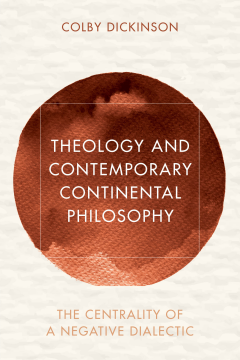
Additional Information
Book Details
Abstract
This book aims to put modern continental philosophy, specifically the sub-fields of phenomenology, existentialism, hermeneutics, deconstruction, critical theory and genealogy, into conversation with the field of contemporary theology. Colby Dickinson demonstrates the way in which negative dialectics, or the negation of negation, may help us to grasp the thin (or non-existent) borders between continental philosophy and theology as the leading thinkers of both fields wrestle with their entrance into a new era. With the declining place of “the sacred” in the public sphere, we need to pay more attention than ever to how continental philosophy seems to be returning to distinctly theological roots.
Through a genealogical mapping of 20th-century continental philosophers, Dickinson highlights the ever-present Judeo-Christian roots of modern Western philosophical thought. Opposing categories such as immanence/transcendence, finitude/infinitude, universal/particular, subject/object, are at the center of works by thinkers such as Agamben, Marion, Vattimo, Levinas, Latour, Caputo and Adorno. This book argues that utilizing a negative dialectic allows us to move beyond the apparent fixation with dichotomies present within those fields and begin to perform both philosophy and theology anew.
Dickinson argues for more fluid fertile borderlands between philosophy and theology. Deploying a dialectics of 'double negation' he critiques the mega-narratives of modernity in order to open a new 'logics' of transfusion between faith and reason. This allows for a positive revisiting of the roots of theological inquiry while embracing the most robust resources of postmodern thinking. A timely, bold and engaging work.
Richard Kearney, Charles Seelig Professor of Philosophy, Boston College
Colby Dickinson is Associate Professor of Theology at Loyola University, Chicago. He is the author of Agamben and Theology (2011), Between the Canon and the Messiah (2013) and Words Fail: Theology, Poetry, and the Challenge of Representation (2016), as well as numerous articles on contemporary continental philosophy and theology. He is editor of The Postmodern ‘Saints’ of France (2013) and The Shaping of Tradition: Context and Normativity (2013).
This book is more than a masterful mapping of a huge swath of contemporary theology and continental philosophy. Dickinson’s negative dialectic is also a cookbook of risky strategies—so many spiritual exercises on offer to us-- which situate living thought along a precarious fault line of disenchantment and hope that neither philosophy nor theology can successfully manage.
Ward Blanton, Reader in Biblical Cultures and European Thought, University of Kent
Dickinson is one of our best guides to the leading edges where continental philosophy and theology intersect. In Theology and Contemporary Continental Philosophy, he offers a concise, accessible overview of this interaction. The negative dialectics of philosophy are entangled with negative theology to generate a weakened but transformative discourse that opens up both to other, nondualist ways of thinking.
Clayton Crockett, professor and director of religious studies, University of Central Arkansas
Table of Contents
| Section Title | Page | Action | Price |
|---|---|---|---|
| Cover | Cover | ||
| Half Title | i | ||
| Series Information | ii | ||
| Title Page | iii | ||
| Copyright Page | iv | ||
| Dedication | v | ||
| Contents | vii | ||
| Acknowledgments | ix | ||
| Introduction | 1 | ||
| 1 On the Relationship of Continental Philosophy to Theology | 9 | ||
| 2 Toward a Negative Dialectic | 33 | ||
| 3 The Gap within Existence as Theological Motif | 69 | ||
| 4 The Phenomenological (Re)turn | 107 | ||
| Conclusion | 129 | ||
| Bibliography | 133 | ||
| Index | 153 | ||
| Aboutthe Author | 159 |
